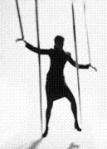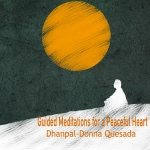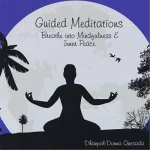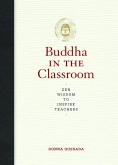 Is the highest attainment in life realized when we’re able to accept where we are, without striving? Or, are we supposed to chase our dreams and pursue our passions? In my book, Buddha in the Classroom, I speak of the importance of acceptance, as an expression of our capacity to liberate ourselves from the endless chain of yearnings that characterize existence and from the resistance and corresponding angst that comes up when those yearnings aren’t fulfilled .
Is the highest attainment in life realized when we’re able to accept where we are, without striving? Or, are we supposed to chase our dreams and pursue our passions? In my book, Buddha in the Classroom, I speak of the importance of acceptance, as an expression of our capacity to liberate ourselves from the endless chain of yearnings that characterize existence and from the resistance and corresponding angst that comes up when those yearnings aren’t fulfilled .
A snippet of that part of my book —
(Excerpt from Chapter 19—Passion; Accept, Adapt, and Abandon Hope)
The real problem with our fixation on passion is the near certainty that even a blazing fire will dim with time.
Then what?
Even when passion is pursued and found, the affair won’t last forever. Passion changes. We change. A dancer friend recently shared with me the common experience among the cast members of a famous musical. Far from reveling in prideful accomplishment for having been part of one of the longest-running shows, they’re sick and tired physically, and mentally jaded. Many are dancing on old injuries, and are scarcely able to find the motivation to go onstage night after night; yet somehow they manage to put themselves into their postures and glissade, on tiptoe, onto the stage, one more time, because it’s how they make their living. It is the same motivation that gets most of the world to work every day.
It reminds me of the ancient Greek myth about Sisyphus: He is condemned by the gods to push a gigantic boulder up a hill, over and over, all day long, even as it continuously rolls to the bottom of its own weight as soon as he gets it to the top. The gods understood the futility of wasted labor, so assigning it was the perfect, wicked punishment. In retelling the story, the French philosopher Albert Camus likens the absurdity of the task to the everyday predicament of every single one of us, pushing our rocks in our own way, as we struggle to meet deadlines, deal with coworkers and bosses, and solve the problems that are part and parcel of any workday, anywhere.
But Camus was an optimist.
Despite his fate, it is Sisyphus himself who decides to be happy. He can whistle and hum happy songs while he pushes his rock, or he can lament and endlessly curse his fate. The irony is that as soon as he realizes the power inherent in his own reaction, he is liberated. He makes his fate his own. It is he alone who decides to be happy or miserable. In a nod to our own capacity for liberation, Camus says, “We must imagine Sisyphus smiling.”
Dharma: The Lesson for Teachers
Sisyphus’s existentialist smile resonates with the Buddhist reminder to let go. Sisyphus smiles because he accepts his fate. To let go is to accept. And through acceptance, Sisyphus liberates himself from his sentence. To accept is to simultaneously stop resisting. When you stop resisting, you are able to enjoy your experiences, which is to say, your life.
Accept, adapt, and abandon hope, Zen says…
Do I still think this is the Truth?—
Yes, but it’s not the whole truth. It’s true on one level, just as, when you’re a certain age, following a rule of conduct is important, but it’s also true that this same rule may no longer apply, at another stage or moment in your life. There are different truths for different stages of our journey. Acceptance is true and passion is true.
Consider Gandhi. He had a passion for restoring justice and liberation to India, but every time they threw him in jail, his only savior was surrender. Acceptance was the rule of the hour. It didn’t mean he was giving up his broader plan. It just meant he had the wisdom to know when to act. There’s a time for everything. Thus, we can be our own captors (through resistance) or liberators (through acceptance).
There’s a time to express our passion in life. And this is what I would like to now give proper importance to.
Very simply put, if we’re interested in what we’re doing, that interest will carry us through the inevitable challenges that come along with anything. It reminds me of an oft recited quote by an unknown author:
Without enthusiasm, you’ll find any reason to quit. With enthusiasm, you’ll overlook every reason. ~unknown
Whether or not to follow our passions depends largely on the choices we have available. If we are lucky enough to live in a physical environment in which we are politically free and financially able to pursue our desires, we might consider the luxury we have been given in this incarnation and go about it with zest and gratitude. But, if this is not the case, then acceptance for the karma we have chosen for ourselves in this existence will serve us well.
Even with this said, acceptance is a tool that serves us, even then, for no position or pursuit is all paradise, all the time. We will always deal with difficult people and occasional burnout, but when the joy and sense of purpose is greater than the misery, or put another way, when it uplifts more than it drains, we carry on, knowing that we’re serving the world through the work that we do. And again, gratitude for the opportunity to do it, will carry us. Acceptance is a great succor and support in every part of life.
A more profound reason to give voice to our passions.
Soul Speaks—
I call it Soul Speaks…as when a child shows signs of his/her inclination early on. This is a sort of magic that gives our life a sparkly quality and makes us feel we have something to live for. It is our inner longing showing up before we even understand it or know how to give voice to it. It is our soul speaking. This voice, that starts out as a little whisper—such as when we’re first attracted to some activity—may one day combine with skill, and this fusion in time and space is like the key that unlocks the door to brilliance.
If you can’t figure out your purpose, figure out your passion. For your passion will lead you directly to your purpose. ~unknown
Power Spot—
The power spot is another little expression I have to describe this kind of brilliance…such as when Pavarotti sings. When you hit your power spot, everyone around you feels it, although they may not know what to call it. It is felt. A pop phrase for this inexplicable phenomenon is the “it factor.” A person is shining in their craft, doing exactly what they are supposed to be doing. And their radiance glimmers like a shining gift to the world.
Is there such a thing, metaphysically, as “purpose?”—
Which opens up another question. And this is what it all hinges on…do we really have a purpose? If we did, who gets to say what it is? How will we know what it truly is? Do we have only one? Can we choose to do something else?
It all comes down to trusting our own feeling. No one else can decide for us. It is not an intellectual decision, that can be decided by a list of pros and cons, as we were taught to do in school. We will know our purpose because it feels right. And yes, that purpose can change, just as our relationships can change. Just as some relationships are karmic in nature and are finished when the karma has been played out the and lessons have been learned. Our purpose at one time can shift into a new direction after we have served in that area and our time there is finished.
More about “feeling” it—
When we’re not doing what we’re “supposed to be doing,” everything in our life just feels “off.” We feel drained, rather than uplifted and satisfied. Everything feels much more laborious than need be.
Life is not supposed to feel like drudgery, anyway—this is an outdated and misguided belief based on guilt. When we’re on the path that is right for us, everything falls into a flow, what one of my teachers calls effortless effort. This is the law of abundance; everything will fall into place when we trust and when we align ourselves with our heart.
The Way of Efficiency—
Besides being in tune with what feels right, there’s a sense of efficiency and capacity that becomes evident when we are in the “right place.” Not only do we tend to thrive, personally, but our performance has the potential for excellence. Although we might like to give some activity a fair chance, for the sake of curiosity, we may or may not be any good at it. I remember when my father gave dancing the good old college try for the sake of pleasing my mother, but a Fred Astaire this scientist was not!
Along these lines, we may consider a tree or a houseplant. Although it can adapt to different environments if necessary, it simply does better in “the right” environment, and will produce better fruit. Some plants need more light, more water, etc. In human terms, we call it “being in your element.”
Or, consider a car. You may eventually get to your destination on subpar gasoline, or low oil, but it will do better on better gas and more oil. In human terms, it’s our choice—we can waste energy or work more efficiently, by being in tune with our soul’s purpose.
Establish your passions on a day to day basis. Whatever you attach your conscious and undoubted passions to will manifest. ~Guru Singh
In spiritual teachings, it is said that this is how we know when we are going the right way or not. God…or, if you prefer…higher wisdom, or angels, or the universe…will assist us and give us signs when we’re going the right way, and lay down hindrances when we’re going the wrong way. Sometimes they may give very loud clues if we’re deaf or daft and are not getting the message! Does this mean we should give up when too many obstacles befall us? Not necessarily! This is the art of walking a line only we can walk for ourselves.
Again, it comes back to the necessity of being present in our bodies, so that we can recognize the many ways that information that is felt, rather than intellectualized. So that we can know on a deeper, more intuitive level. So that we we can trust in our sense that it is not just a challenge, but a sign of something awry.
This connection to Self opens the door to personal joy, which we then shine like a lighthouse out to the world. It is why another one of my spiritual teachers once told me to “follow my bliss,” for when I do, I then bring that de-light to everything and everyone I touch.










